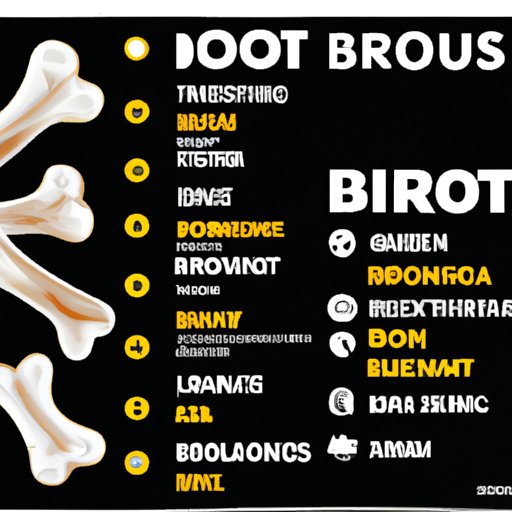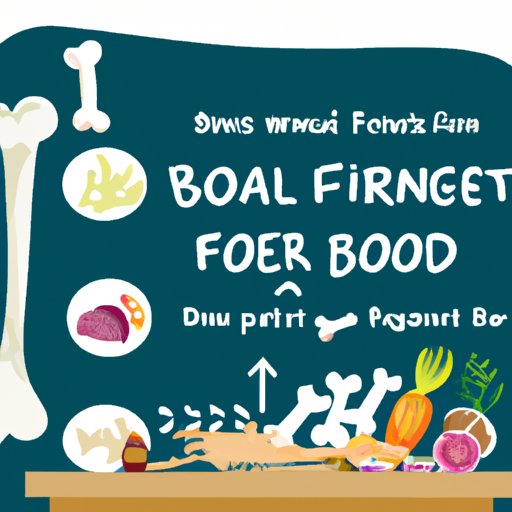Introduction
Bone health is an important part of overall health and well-being. Bones provide structure and support to the body, as well as protecting our organs and helping us to move. In order to keep bones strong and healthy, it is important to ensure that they get the right nutrients. This article will explore which nutrients are necessary for healthy bones, and the role they play in keeping our bones strong and healthy.
Exploring the Nutrients Necessary for Healthy Bones
There are several key nutrients that are essential for healthy bones. These include calcium, vitamin D, magnesium, phosphorus, and other vitamins and minerals. Let’s look at each of these nutrients in more detail.
Calcium
Calcium is one of the most important nutrients for healthy bones. It helps to build strong bones and teeth, and is essential for maintaining normal blood pressure and muscle function. Calcium is found in dairy products such as milk, cheese, and yogurt, as well as in green leafy vegetables, nuts, and some fish. Calcium supplements are also available.
Vitamin D
Vitamin D plays an important role in helping the body absorb calcium. It is found in foods such as eggs, fatty fish, and fortified milk, as well as in supplements. Our bodies also make vitamin D when exposed to sunlight. Vitamin D is important for maintaining healthy bones, muscles, and nerves.
Magnesium
Magnesium is a mineral that helps to regulate calcium levels in the body. It is found in green leafy vegetables, nuts, seeds, and whole grains. Magnesium is important for building strong bones and helping to maintain normal muscle and nerve function.
Phosphorus
Phosphorus is another mineral that is essential for healthy bones. It helps to regulate calcium levels in the body, and is found in dairy products, meat, fish, and eggs. Phosphorus is important for maintaining strong bones and teeth.
Other Nutrients
In addition to calcium, vitamin D, magnesium, and phosphorus, there are other vitamins and minerals that are important for bone health. These include zinc, vitamin K, and boron. Eating a balanced diet with plenty of fruits and vegetables can help ensure that you are getting all the nutrients needed for healthy bones.
The Role of Different Nutrients in Bone Health
Each of the nutrients discussed above has an important role to play in maintaining healthy bones. Let’s take a closer look at how each nutrient contributes to bone health.
Calcium
Calcium is the most abundant mineral in the body, and is essential for building strong bones and teeth. It helps to regulate blood pressure and muscle function, and is important for maintaining healthy bones and joints. Without adequate calcium intake, bones can become weak and brittle.
Vitamin D
Vitamin D helps the body to absorb calcium, and is important for maintaining healthy bones, muscles, and nerves. Vitamin D is found in foods such as eggs, fatty fish, and fortified milk, as well as in supplements. It is also produced in the body when exposed to sunlight.
Magnesium
Magnesium helps to regulate calcium levels in the body, and is important for building strong bones and maintaining normal muscle and nerve function. Magnesium is found in green leafy vegetables, nuts, seeds, and whole grains.
Phosphorus
Phosphorus helps to regulate calcium levels in the body, and is essential for maintaining strong bones and teeth. It is found in dairy products, meat, fish, and eggs.
Other Nutrients
Other vitamins and minerals that are important for bone health include zinc, vitamin K, and boron. Eating a balanced diet with plenty of fruits and vegetables can help ensure that you are getting all the nutrients needed for healthy bones.

An Overview of Key Nutrients for Strong Bones
Calcium, vitamin D, magnesium, and phosphorus are all key nutrients for strong bones. Calcium helps to build strong bones and teeth, and is essential for maintaining normal blood pressure and muscle function. Vitamin D helps the body to absorb calcium, and is important for maintaining healthy bones, muscles, and nerves. Magnesium helps to regulate calcium levels in the body, and is important for building strong bones and maintaining normal muscle and nerve function. Phosphorus helps to regulate calcium levels in the body, and is essential for maintaining strong bones and teeth.

The Benefits of Eating a Balanced Diet for Bone Health
Eating a balanced diet is essential for optimal bone health. Adequate calcium and vitamin D intake can help to build and maintain strong bones, while a diet rich in magnesium and phosphorus can help to regulate calcium levels in the body. Eating a balanced diet can also help to lower the risk of osteoporosis, a condition where bones become weak and brittle due to low calcium and vitamin D levels.

A Guide to Essential Nutrients for Keeping Bones Healthy
It is important to ensure that you are getting enough of the essential nutrients for healthy bones. Here are some suggestions for foods that are rich in calcium, vitamin D, magnesium, and phosphorus:
Foods Rich in Calcium
Dairy products such as milk, cheese, and yogurt; green leafy vegetables such as kale and spinach; nuts; and some fish, such as salmon and sardines.
Foods Rich in Vitamin D
Eggs, fatty fish such as salmon and tuna, and fortified milk.
Foods Rich in Magnesium
Green leafy vegetables such as spinach and kale, nuts, seeds, and whole grains.
Foods Rich in Phosphorus
Dairy products, meat, fish, and eggs.
Other Nutrient-Rich Foods
Fruits and vegetables, as well as nuts, seeds, and whole grains are all good sources of other vitamins and minerals that are important for bone health.
Conclusion
Eating a balanced diet is essential for optimal bone health. Calcium, vitamin D, magnesium, and phosphorus are all key nutrients for strong bones, and it is important to ensure that you are getting enough of these nutrients. Eating a variety of nutrient-rich foods such as dairy products, green leafy vegetables, nuts, and fish can help to ensure that you are getting all the nutrients needed for healthy bones. By following these guidelines, you can help to ensure that your bones remain strong and healthy.
(Note: Is this article not meeting your expectations? Do you have knowledge or insights to share? Unlock new opportunities and expand your reach by joining our authors team. Click Registration to join us and share your expertise with our readers.)
